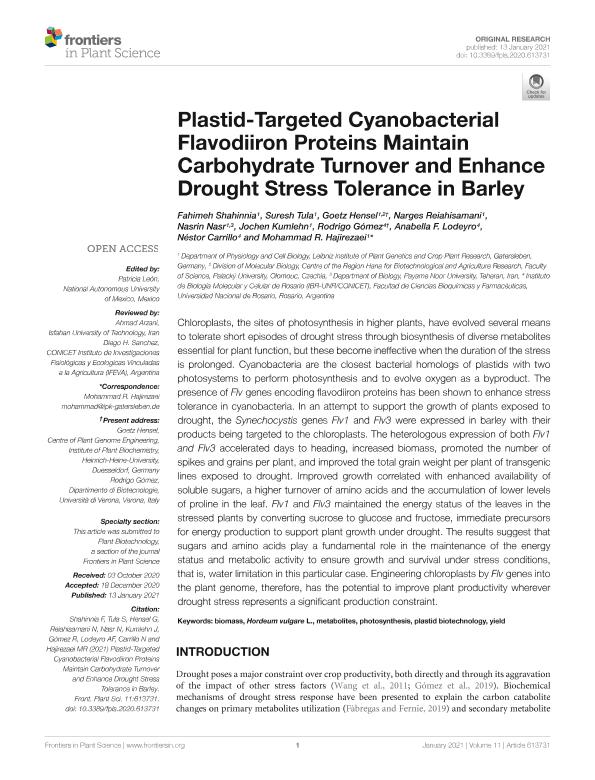Mostrar el registro sencillo del ítem
dc.contributor.author
Shahinnia, Fahimeh
dc.contributor.author
Tula, Suresh
dc.contributor.author
Hensel, Goetz
dc.contributor.author
Reiahisamani, Narges
dc.contributor.author
Nasr, Nasrin
dc.contributor.author
Kumlehn, Jochen
dc.contributor.author
Gomez, Rodrigo Lionel

dc.contributor.author
Lodeyro, Anabella Fernanda

dc.contributor.author
Carrillo, Nestor Jose

dc.contributor.author
Hajirezaei, Mohammad Reza
dc.date.available
2023-01-26T11:26:45Z
dc.date.issued
2021-01
dc.identifier.citation
Shahinnia, Fahimeh; Tula, Suresh; Hensel, Goetz; Reiahisamani, Narges; Nasr, Nasrin ; et al.; Plastid-Targeted Cyanobacterial Flavodiiron Proteins Maintain Carbohydrate Turnover and Enhance Drought Stress Tolerance in Barley; Frontiers Media; Frontiers in Plant Science; 11; 1-2021; 1-15
dc.identifier.issn
1664-462X
dc.identifier.uri
http://hdl.handle.net/11336/185670
dc.description.abstract
Chloroplasts, the sites of photosynthesis in higher plants, have evolved several means to tolerate short episodes of drought stress through biosynthesis of diverse metabolites essential for plant function, but these become ineffective when the duration of the stress is prolonged. Cyanobacteria are the closest bacterial homologs of plastids with two photosystems to perform photosynthesis and to evolve oxygen as a byproduct. The presence of Flv genes encoding flavodiiron proteins has been shown to enhance stress tolerance in cyanobacteria. In an attempt to support the growth of plants exposed to drought, the Synechocystis genes Flv1 and Flv3 were expressed in barley with their products being targeted to the chloroplasts. The heterologous expression of both Flv1 and Flv3 accelerated days to heading, increased biomass, promoted the number of spikes and grains per plant, and improved the total grain weight per plant of transgenic lines exposed to drought. Improved growth correlated with enhanced availability of soluble sugars, a higher turnover of amino acids and the accumulation of lower levels of proline in the leaf. Flv1 and Flv3 maintained the energy status of the leaves in the stressed plants by converting sucrose to glucose and fructose, immediate precursors for energy production to support plant growth under drought. The results suggest that sugars and amino acids play a fundamental role in the maintenance of the energy status and metabolic activity to ensure growth and survival under stress conditions, that is, water limitation in this particular case. Engineering chloroplasts by Flv genes into the plant genome, therefore, has the potential to improve plant productivity wherever drought stress represents a significant production constraint.
dc.format
application/pdf
dc.language.iso
eng
dc.publisher
Frontiers Media

dc.rights
info:eu-repo/semantics/openAccess
dc.rights.uri
https://creativecommons.org/licenses/by-nc-sa/2.5/ar/
dc.subject
BIOMASS
dc.subject
HORDEUM VULGAREL
dc.subject
METABOLITES
dc.subject
PHOTOSYNTHESIS
dc.subject
PLASTID BIOTECHNOLOGY
dc.subject
YIELD
dc.subject.classification
Bioquímica y Biología Molecular

dc.subject.classification
Ciencias Biológicas

dc.subject.classification
CIENCIAS NATURALES Y EXACTAS

dc.title
Plastid-Targeted Cyanobacterial Flavodiiron Proteins Maintain Carbohydrate Turnover and Enhance Drought Stress Tolerance in Barley
dc.type
info:eu-repo/semantics/article
dc.type
info:ar-repo/semantics/artículo
dc.type
info:eu-repo/semantics/publishedVersion
dc.date.updated
2022-09-19T16:07:19Z
dc.journal.volume
11
dc.journal.pagination
1-15
dc.journal.pais
Suiza

dc.description.fil
Fil: Shahinnia, Fahimeh. Leibniz Institute Of Plant Genetics And Crop Plant Research; Alemania
dc.description.fil
Fil: Tula, Suresh. Leibniz Institute Of Plant Genetics And Crop Plant Research; Alemania
dc.description.fil
Fil: Hensel, Goetz. Leibniz Institute Of Plant Genetics And Crop Plant Research; Alemania
dc.description.fil
Fil: Reiahisamani, Narges. Leibniz Institute Of Plant Genetics And Crop Plant Research; Alemania
dc.description.fil
Fil: Nasr, Nasrin. Leibniz Institute Of Plant Genetics And Crop Plant Research; Alemania
dc.description.fil
Fil: Kumlehn, Jochen. Leibniz Institute Of Plant Genetics And Crop Plant Research; Alemania
dc.description.fil
Fil: Gomez, Rodrigo Lionel. Consejo Nacional de Investigaciones Científicas y Técnicas. Centro Científico Tecnológico Conicet - Rosario. Instituto de Biología Molecular y Celular de Rosario. Universidad Nacional de Rosario. Facultad de Ciencias Bioquímicas y Farmacéuticas. Instituto de Biología Molecular y Celular de Rosario; Argentina
dc.description.fil
Fil: Lodeyro, Anabella Fernanda. Consejo Nacional de Investigaciones Científicas y Técnicas. Centro Científico Tecnológico Conicet - Rosario. Instituto de Biología Molecular y Celular de Rosario. Universidad Nacional de Rosario. Facultad de Ciencias Bioquímicas y Farmacéuticas. Instituto de Biología Molecular y Celular de Rosario; Argentina
dc.description.fil
Fil: Carrillo, Nestor Jose. Consejo Nacional de Investigaciones Científicas y Técnicas. Centro Científico Tecnológico Conicet - Rosario. Instituto de Biología Molecular y Celular de Rosario. Universidad Nacional de Rosario. Facultad de Ciencias Bioquímicas y Farmacéuticas. Instituto de Biología Molecular y Celular de Rosario; Argentina
dc.description.fil
Fil: Hajirezaei, Mohammad Reza. Leibniz Institute Of Plant Genetics And Crop Plant Research; Alemania
dc.journal.title
Frontiers in Plant Science
dc.relation.alternativeid
info:eu-repo/semantics/altIdentifier/url/https://www.frontiersin.org/articles/10.3389/fpls.2020.613731/full
dc.relation.alternativeid
info:eu-repo/semantics/altIdentifier/doi/http://dx.doi.org/10.3389/fpls.2020.613731
Archivos asociados
